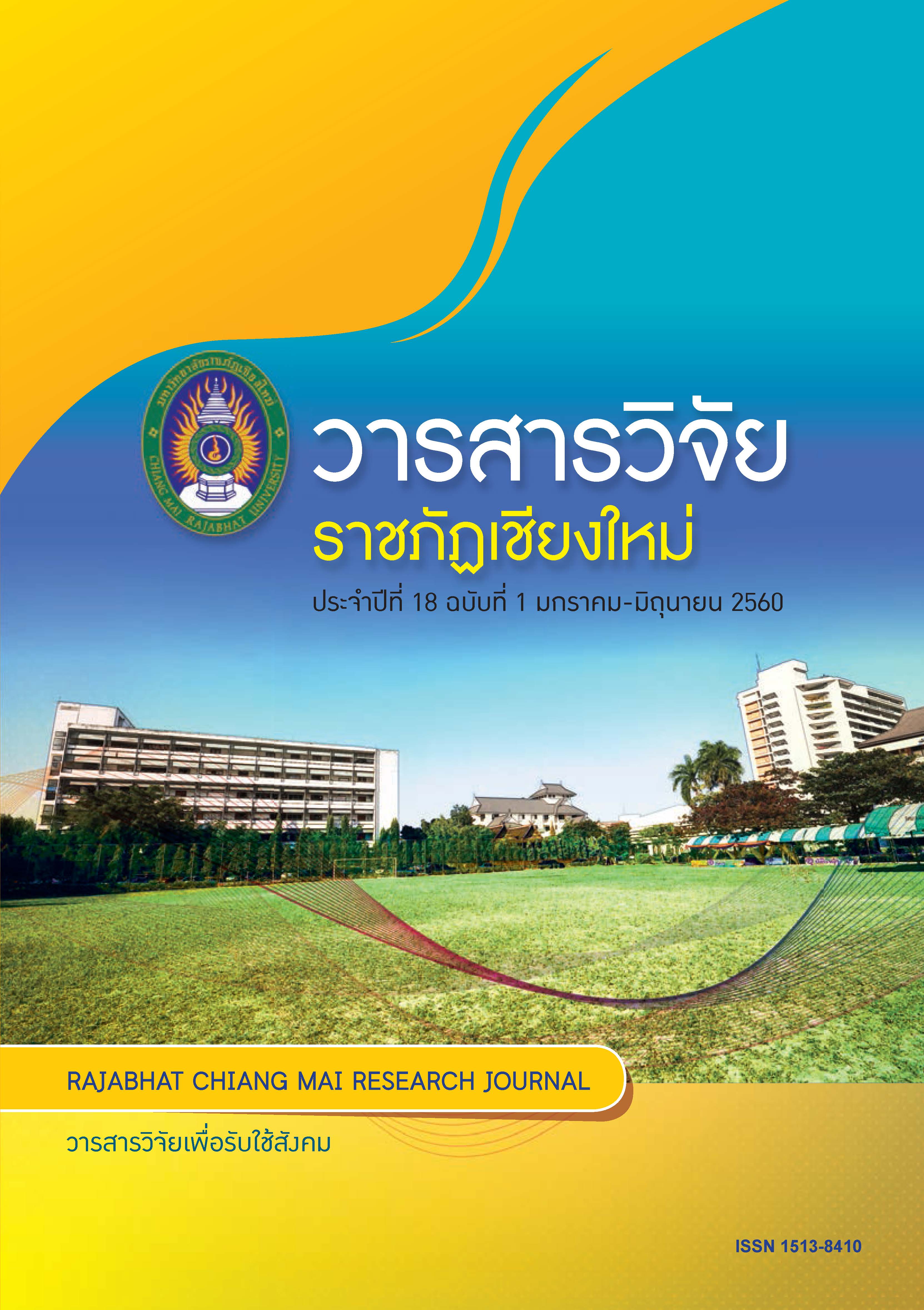ธนาคารพลังงานชุมชนสำหรับการผลิตผลิตไฟฟ้าโดยใช้พลังงานทดแทน กรณีศึกษา ชุมชนชนบทในจังหวัดตาก
DOI:
https://doi.org/10.14456/rcmrj.2017.213798คำสำคัญ:
พลังงานทดแทน, การพัฒนาอย่างยั่งยืน, ธนาคารพลังงานบทคัดย่อ
ประเทศไทยได้ตั้งเป้าหมายที่สูงในการใช้พลังงานทางเลือกรวมไปถึงพลังงานทดแทน ซึ่งการส่งเสริมการใช้พลังงานหมุนเวียนในประเทศไทยในช่วงไม่กี่ปีที่ผ่านมามีความชัดเจน แต่ส่วนใหญ่ไม่ยั่งยืนเนื่องจากขาดความตระหนักและความสามารถด้านเทคนิคที่นำไปสู่การลงทุนระยะสั้น โครงการนี้มีวัตถุประสงค์เพื่อประเมินการพัฒนาพลังงานผสมและศักยภาพด้านพลังงาน รวมถึงการส่งเสริมธนาคารพลังงานชุมชน เพื่อความยั่งยืนโดยใช้รูปแบบการลงทุน สำหรับการผลิตกระแสไฟฟ้าทดแทนจากชุมชนในชุมชนชนบทในจังหวัดตาก ประเทศไทย ซึ่งบางชุมชนไม่ได้มีการเข้าถึงเครือข่ายของส่วนกลางได้อย่างเต็มที่ โดยใช้วิธีการวิจัยแบบผสมและวิธีเชิงคุณภาพจากการขอคำแนะนำของผู้มีส่วนได้เสีย ในรูปแบบการลงทุนที่ได้รับการเสนอให้กับชุมชน การประเมินโครงการแสดงให้เห็นศักยภาพทางเศรษฐกิจสำหรับพลังงานชีวมวลและก๊าซชีวภาพ ดังนั้นผู้มีส่วนได้เสียและผู้เชี่ยวชาญด้านพลังงานเห็นด้วยกับข้อเสนอของธนาคารพลังงานที่ให้เงินทุนไหลเข้าและการไหลออกของวัตถุดิบโดยสมดุลกับรายได้และการผลิตไฟฟ้า ระบบการจัดการแบบมีส่วนร่วมบนพื้นฐานของการสร้างขีดความสามารถทางเทคนิค ได้รับการเสนอและ การระบุบุคคลเข้าร่วมลงทุน
Downloads
เอกสารอ้างอิง
Carlisle, N., Elling, J. and Penney, T. 2008. A Renewable Energy Community: Key Elements. (Prepared under Task No. 2940.0007). A national laboratory of the U.S. Department of Energy. Office of Energy Efficiency & Renewable Energy.
Chanovit, W. 2014. Cost Benefit Analysis of Solar photovoltaic rooftop project (Residential type) in different radiation area of Thailand. (online). Retrieved from: http://econ.nida.ac.th/index.php?option=com_content&view=article&id=3034%3A----mbe2557&catid=129%3Astudent-independent-study&Itemid=207&lang=th (December 16, 2016)
Chunam, P. n.d.. How to apply sufficient economy philosophy in community level. In Hongpakdee, N. (editor). Sufficient economy philosophy and Thai society. pp. 154-168. Bangkok: Studies Center of Sufficiency Economy NIDA.
Department of Alternative Energy Development and Efficiency. n.d.. 15 years energy development plan 2008-2023. (online). Retrieved from: http://www.eppo.go.th /ccep/download/REDP_15_yrs.pdf (December 15, 2016)
Department of Alternative Energy Development and Efficiency. 2015. Alternative Energy Development Plan : AEDP2015. (online). Retrieved from: http://www.eppo.go.th /images/POLICY/PDF/AEDP2015.pdf (December 15, 2016)
Department of Pollution Control. 2008. The handbook of reduction, segregation, and utilize garbages for environment protection volunteers. Bangkok: Rungsilp publishing.
Dyson, C. and Jennifer E. Canseco, 2008. Best Practices in Community Energy-Efficiency and Renewable Energy Partnership Programs. pp.74-84. Proceedings of 2008 ACEEE Summer Study on Energy Efficiency in Building.
Heruela, C. 2006. Renewable Energy for Rural Development in the Mekong Region. International Journal of Renewable Energy, 1(2), 1-5.
Johansen, J.P. and Royrvik, J. 2014. Organizing synergies in integrated energy systems. Energy Procedia 58. pp.24 – 29. Renewable Energy Research Conference, RERC 2014.
Kriyapak, S. 2009. Appropriate community energy management. Thesis M.Sc, NIDA.
Klomjit, K. and Kaweeyarn, K. 2011. Appropriate renewable energy for Thailand under global warming crisis. Engineering Press, 76(24), 23-32.
Maneeprauk, S. 2001. Community economy ideas. In The production committee of economic history and ideas (editor). Economic history and ideas document unit 15. Nonthaburi: Sukhothai Thammathirat Open University.
Natsupa, C. 2005. Ideas of community economy in different society. 2nd ed. Bangkok: Saang San.
Noratus, T. 2007. The driven philosophy of Sufficiency Economy in the industrial sector with TIS. 9999. (Online). Retrieved from: https://www.gotoknow.org/posts/573126 (December 16, 2016)
Office of the National Economic and Social Development Board. 2012. The Eleventh National Economic and Social Development Plan (2012 - 2016). (online). Retrieved from: http://www.nesdb.go.th/download/article/article_20160323112431.pdf (September 5, 2016)
Phanhingong, K. n.d. Exploring knowledge for Thailand reforming: Land Bank. Nonthaburi: Office of reforming.
Phoochinda, W. 2009. How to apply sufficient economy philosophy to community energy management. Environmental management, 5(2), 118-136.
Phoochinda. 2010. Lessons learned from successful community energy management by complying to sufficient economy philosophy. Environmental management, 6(2), 113-131.
Phoochinda. 2015. Initial assessment of the social return on investment of electricity generation using biomass : a case study of gasifier plant. Journal of Environmental Management, 11(2), 90-105.
Siamintelligence. 2011. ExxonMobil energy industry forecasts 2040 the world requires 30% more energy. (online). Retrieved from: http://www.siamintelligence.com/exxonmobil-
energy-outlook-2040/Worldalert: renewable energy boosted. (September 12, 2011)
Sirikoon, S. 2010. Micro-scale biomass power plant development and community issues. Documents for the Micro-scale biomass power plant promptness and potentiality for community seminar. Bangkok.
Sriwichailampan, T. 2012. Community business development. Chiangmai: Faculty of Economics, Chiang Mai University.
Upretia, B.U. and Horst, D.V. 2004. National renewable energy policy and local opposition in the UK : the failed development of a biomass electricity plant. Biomass and Bioenergy, 26(1), 61-69.
Watjanatepin, N. et.al. 2008. Evaluation of Electrical Service Acceleration Project By Solar Home System : SHS. Paper presented at the 4th Conference On Energy Network of Thailand (E-NETT), 14-16 MAY 2008. (Online). Retrieved from:
http://eng.rmutsb.ac.th/events/admin2/Redearch_papers/Evaluation%20of%20Electrical%20Service%0Acceleration%20Project%20By%20Solar%20Home%20System.pdf (December 16, 2016)
What is Tree Bank. n.d. (online). Retrieved from: http://www.treebankthai.com/images/intro_ 1324056483/%C3%D9%E9%A8%D1%A1%20%B8%B5%C1.pdf (September 5, 2016)
ดาวน์โหลด
เผยแพร่แล้ว
รูปแบบการอ้างอิง
ฉบับ
ประเภทบทความ
สัญญาอนุญาต
1. บทความ ข้อมูล เนื้อหา รูปภาพ ฯลฯ ที่ได้รับการตีพิมพ์ใน “Community and Social Development Journal” ถือเป็นลิขสิทธิ์ของ Community and Social Development Journal มหาวิทยาลัยราชภัฏเชียงใหม่ และเพื่อให้เผยแพร่บทความได้อย่างเหมาะสมผ่านสื่อสิ่งพิมพ์และอิเล็กทรอนิกส์ ผู้เขียนยังคงถือครองลิขสิทธิ์บทความที่ตีพิมพ์ภายใต้ใบอนุญาต Creative Commons Attribution (CC BY) ซึ่งอนุญาตให้เผยแพร่บทความซ้ำในแหล่งอื่นได้ โดยอ้างอิงต้องอ้งอิงบทความในวารสาร ผู้เขียนต้องรับผิดชอบในการขออนุญาตผลิตซ้ำเนื้อหาที่มีลิขสิทธิ์จากแหล่งอื่น
2. เนื้อหาบทความที่ปรากฏในวารสารเป็นความรับผิดชอบของผู้เขียนบทความโดยตรง ซึ่งกองบรรณาธิการวารสารไม่จำเป็นต้องเห็นด้วยหรือร่วมรับผิดชอบใดๆ














